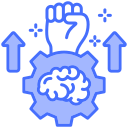Embracing a growth mindset is essential for building resilience and overcoming obstacles in life. A growth mindset, the belief that abilities and intelligence can be developed through dedication and effort, empowers individuals to face challenges head-on and learn from setbacks. By integrating this perspective into daily life, individuals can strengthen their resilience and foster a sense of continuous self-improvement. This page explores actionable strategies and insights for cultivating a growth mindset and harnessing it to boost resilience, enabling you to thrive in the face of adversity.
Understanding Growth Mindset and Resilience
Foundations of Growth Mindset
A growth mindset hinges on the conviction that one’s abilities are malleable and can be improved with effort, strategies, and persistence. This belief contrasts sharply with a fixed mindset, which sees abilities as innate and unchangeable. People with growth mindsets are more likely to embrace challenges, persist through obstacles, learn from criticism, and seek out inspiration in others’ success. Cultivating this mindset involves challenging internalized notions about talent and intelligence, shifting the focus towards the process of learning and continuous self-improvement.
The Power of Resilience
Resilience is the ability to bounce back from setbacks and adapt to adversity with a positive outlook. It draws upon inner strengths and learned strategies to withstand and recover from challenges, making it invaluable in both personal and professional contexts. Resilient individuals tend to see failures as temporary and surmountable, viewing them as opportunities for growth rather than permanent roadblocks. Building resilience is an ongoing journey, and a growth mindset acts as fertile ground for this crucial skill to flourish.
Interconnection of Mindset and Resilience
A growth mindset primes the mind for resilience by reframing challenges as opportunities for learning and development. When you believe that effort leads to improvement, setbacks become less daunting, and recovery is more manageable. This interconnection means that developing one of these traits actively strengthens the other, creating a cycle of positive reinforcement. By fostering both a growth mindset and resilience, individuals become better equipped to face life’s inevitable upheavals and continue progressing towards their goals.
Self-sabotage often manifests through negative self-talk and recurring patterns that undermine goals. This behavior stems from deep-seated limiting beliefs about what one is or isn’t capable of achieving. Recognizing these patterns requires honest self-reflection and a willingness to question the stories you tell yourself about your limitations. By identifying moments when you hold yourself back or shy away from challenges, you lay the groundwork for change and activate the growth mindset needed for resilience.
Challenging Limiting Beliefs

Previous slide
Next slide
Developing Effective Coping Strategies
Constructive self-reflection involves analyzing one’s thoughts, actions, and outcomes in a nonjudgmental way. This practice allows you to identify patterns, understand triggers, and evaluate responses to stress or failure. Regular self-reflection builds self-awareness, enabling you to respond more thoughtfully to future challenges. Over time, this approach transforms mistakes into valuable sources of insight, turning reflection into a foundation for growth and resilience.


Focusing on Process Over Outcome
Concentrating on the learning process rather than just the end result is a core tenet of the growth mindset. By valuing effort, persistence, and incremental improvements, you develop an intrinsic motivation to keep evolving. This perspective emphasizes progress over perfection, making it easier to stay resilient when setbacks arise. Over time, a process-oriented approach leads to more sustainable growth and a deeper sense of satisfaction with your achievements.

Celebrating Small Wins
Acknowledging and celebrating small victories builds confidence and fuels further progress. Each achievement, no matter the scale, serves as evidence of your ability to learn and adapt. Recognizing these incremental improvements sustains motivation and reinforces the belief in your own potential. This practice not only cultivates resilience by creating a feedback loop of positivity but also encourages a long-term commitment to personal and professional growth.

Adjusting Goals to Accommodate Change
Adapting your goals in response to changing circumstances is crucial for maintaining momentum and resilience. Life is dynamic, and unexpected events may necessitate recalibration. A growth mindset encourages flexibility, allowing you to see goal adjustments not as failures, but as strategic responses to new information or opportunities. This adaptability ensures that progress continues, even when plans shift, and underlines your commitment to ongoing development.
Practicing Self-Compassion and Mindfulness

Cultivating Kindness Towards Oneself
Treating yourself with kindness during setbacks encourages a healthier, more productive response to challenges. Self-compassion involves recognizing that everyone struggles and that imperfection is part of the human experience. By choosing self-kindness over harsh self-judgment, you open the door to recovery and renewed motivation. Compassionate self-talk strengthens resilience by providing an emotional buffer against frustration, disappointment, and fear of failure.

Practicing Present-Moment Awareness
Mindfulness, or present-moment awareness, involves paying attention to thoughts, feelings, and sensations as they arise, without judgment or attachment. This practice helps you respond to challenges thoughtfully, rather than react impulsively. Mindfulness fosters resilience by grounding you in the reality of each situation, reducing anxiety about the past or future. Over time, a mindful approach supports a growth mindset, making it easier to accept both successes and setbacks as integral to your journey.

Letting Go of Perfectionism
Perfectionism can be a significant obstacle to growth and resilience. By learning to let go of unrealistically high standards and embracing effort and learning instead, you create space for improvement without fear of failure. This shift allows you to approach challenges with curiosity and patience, viewing mistakes as essential data rather than disappointments. Letting go of perfectionism enables continuous development while preserving your mental and emotional well-being.
Cultivating Curiosity and Lifelong Learning
Embracing the Beginner’s Mind
Adopting a beginner’s mind means approaching every situation—no matter how familiar—as though seeing it for the first time. This mindset values curiosity and openness over expertise or certainty. When you maintain a beginner’s mind, you stay receptive to new information, alternative approaches, and creative solutions. This openness fuels growth by reducing defensiveness and increasing your capacity to adapt and innovate, further enhancing resilience.
Pursuing New Skills and Experiences
Seeking out new skills and experiences keeps your mind engaged and your adaptability sharp. Every opportunity to learn something new, whether directly related to your goals or outside of your comfort zone, builds cognitive flexibility. Gaining diverse experiences fosters problem-solving abilities, perseverance, and self-confidence—all critical for resilience in a rapidly changing world. The journey of acquiring new competencies is just as valuable as the skills themselves.
Valuing Feedback and Continuous Improvement
A growth mindset welcomes feedback as a catalyst for improvement, rather than as a critique of innate ability. Learning to solicit, accept, and apply feedback is vital for personal and professional development. Each piece of feedback provides insight into potential areas for growth and demonstrates the value of others’ perspectives. By consistently pursuing improvement, you reinforce resilience and underline your commitment to lifelong learning.
